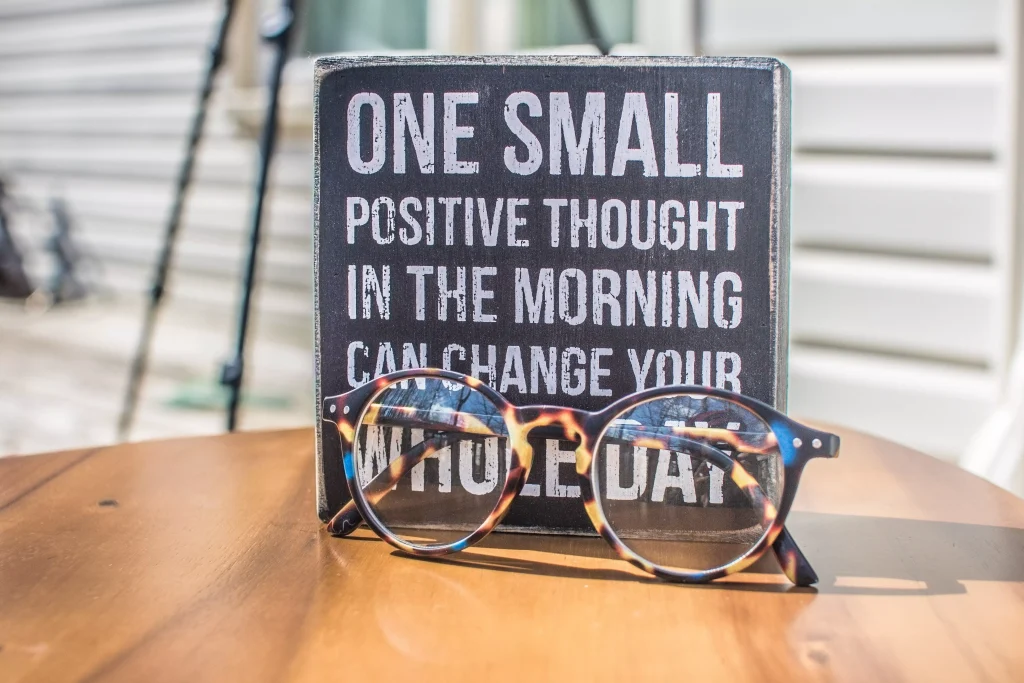All good things happen when positive attitudes are present. Negative attitudes will lead to negative experiences and positive attitudes will lead to positive experiences. The first step you have to take is to start a gratitude journal and practice gratitude with a positive mental attitude. The second step is the change of your mind. Think only about positive things and you will see how it will in creative ways affect your work life and also personal life.
According to experts at Mayo Clinic, good music, for example, has high points in curing difficult situations and improving mental health in your daily life. A disclaimer however is that, when you take real breaks, do not waste too much time on your favorite music, but maybe just add it to your morning routine if you are a morning person.
The third step is that you must feel the right things. You know what they say, the best medicine for professional life and after hard work is a good laugh. Do not take yourself too seriously. A positive attitude means avoiding negative situations and seeking a positive effect to achieve personal goals. Positive attitude examples include a list of ways, for example, volunteering in small communities can be a noble act to improve a positive attitude.
Remember that there is a healthier way to overcome tough situations. For example, a person finds time to speak to his family but does not have the given time for his coworkers, which are with him every day. A good idea is to speak to them as well. At last in this introduction, always see the bigger picture, and never the little mice. This means that you should improve your brain.
Practice math or find other creative ways, but never be static. In the end, after practicing all of these, apply a face mask and relax. See some in detail methods on how to improve your attitude below.
Practice meditation
Meditation may help you reduce stress and anxiety while also improving your mental and spiritual wellbeing. For people who work in high-pressure situations, such as customer support or service, proper meditation may help reduce workplace anxiety.
Even five minutes a day is a good place to start when it comes to meditation. Clear your thoughts and practice deep breathing. Simple tactics like these are easy to use and can help you achieve balance in your life while also letting go of the negativity and tension that you may encounter on a regular basis.
Focus On The Long-Term Instead Of The Short-Term

When a confrontation happens, whether with a colleague or a client, your first instinct may be to defend yourself. It’s a positive thing that you desire to defend yourself and get respect.
The more disputes you participate in, though, the more negativity will surround your existence. Instead, take a second to stand back and examine the issue from a third-party viewpoint. Will it be profitable in the long term to take part in this conflict?
Or will it merely add to the current level of tension and negativity? A client may be having a rough day or a colleague may be under stress. Rather than retaliating, you might show empathy. This may assist you in getting to the heart of the issue and ending the talk in a good, lighter tone.
Surround Yourself With Positive People

“Birds of a feather flock together” may be interpreted in two ways. Members who are similar find one other organically, or people in a group grow similar over time. Surround yourself with individuals who are upbeat. Who you associate with has an impact on you.
If you spend all of your time with negative individuals who moan about everything, you will eventually become a complainer and view the world through their eyes. You may believe that by being optimistic, you would be able to alter things, but this is not the case.
Make an effort to connect with individuals who like their jobs, have fresh ideas, and are interested in a variety of things other than work. It will improve your whole viewpoint. You can’t always choose your coworkers, but you can be selective about how much time and in what atmosphere you spend with them.
If you’re trapped with a bad group, try not to add to their negativity. Instead of immersing yourself in unpleasant breakroom drama and gossip, take pauses and go for a stroll.
Create A Routine For The Day

It’s tempting to believe that having a work routine means you’re caught in a rut or that you’re not “flexible.” Routines, on the other hand, provide us with a decent fall-back framework. A morning routine is particularly beneficial since many individuals are most aware and awake in the morning, but are unable to buckle down and get started.
Create a schedule that allows you to do the most critical tasks first, take appropriate breaks at the appropriate times, and save the final hour or two of the workday for less strenuous tasks and preparation for the following day. By the end of the day, most of us are exhausted, so don’t put off difficult tasks till then. It’s critical to finish each day by preparing for the next.
Be Nice To Other People

It makes you a joy to be nice to others. When it comes to feeling joyful, research published in the Journal of Social Psychology discovered that doing something kind for others had the same impact as attempting new and interesting activities.
What’s better? According to research published in the Journal of Happiness Studies, remembering doing something kind for someone makes us desire to do it again. If you make being kind to others a habit, it will establish a cycle of generosity and pleasure that will make you feel good while also making others around you feel good.
Consider the worst-case scenario for a bad work environment. Negativity grows on itself until it seems to be overpowering. Be kind to others and watch them return the favor. If you can’t get away from your challenging task and maintaining a good attitude about it is difficult, be nice to others around you and let that be an effective replacement. Appreciating and thanking colleagues may make a big difference in your day.
Read more articles in the Lifestyle Category
